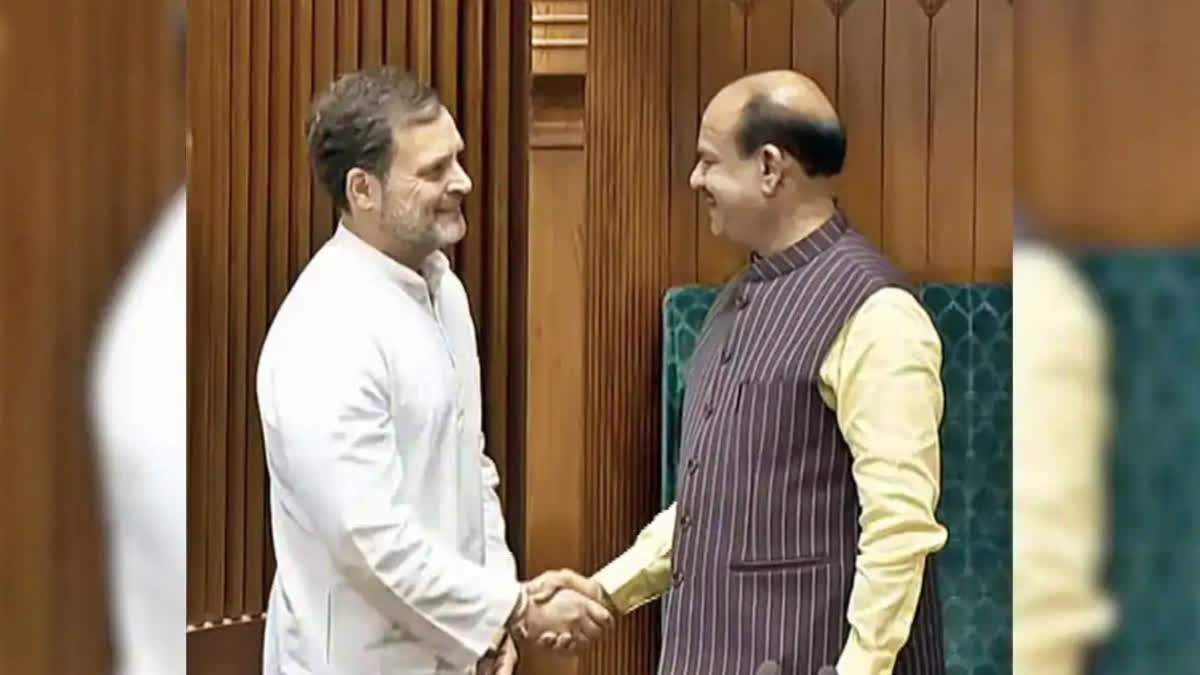New Delhi: Lok Sabha Speaker Om Birla recognised Rahul Gandhi as the leader of opposition on Wednesday, a day after the Congress communicated its decision to name him for the position to the Lok Sabha Secretariat.
In a notification issued on Wednesday, the Lok Sabha Secretariat said Gandhi, leader of the Indian National Congress, had officially been recognised as the leader of opposition in the Lok Sabha with effect from June 9.
This is the first time after a gap of 10 years that there will be a leader of opposition in the Lower House, as the Congress or other opposition parties did not have the 10 per cent members required to claim the post in the 16th and the 17th Lok Sabha.
The Congress MP from Rai Bareli in Uttar Pradesh, Gandhi has been recognised as the leader of opposition under Section 2 of the Salary and Allowances of Leaders of Opposition in Parliament Act, 1977.
Gandhi, who earlier in the day joined Prime Minister Narendra Modi and Parliamentary Affairs Minister Kiren Rijiju in escorting the newly-elected Birla to the speaker's chair, thanked Congress president Mallikarjun Kharge for his appointment to the role.
"I thank Congress president @kharge ji, and all the Congress leaders and 'babbar sher' karyakartas from across the country for their overwhelming support and warm wishes. Together, we will raise the voice of every Indian in Parliament, protect our Constitution, and hold the NDA (National Democratic Alliance) government accountable for their actions," Gandhi said in a post on X.
Gandhi, who is usually seen wearing a white T-shirt and trousers, was clad in a white kurta-pyjama on his first day as opposition leader. This is the first time that Gandhi has taken up a constitutional position in his political career of more than two and a half decades.
Perks That Come With The Role
As the leader of opposition, Gandhi will now be accorded the status of a Cabinet minister. This will also enhance his position in the protocol list. He will also be a member of important panels on key appointments such as the Lokpal, chief election commissioner and election commissioners, the Central Bureau of Investigation (CBI) director, besides the selection of Central Vigilance Commission, Central Information Commission and the National Human Rights Commission chiefs. The prime minister heads all these panels.
Besides getting salary and other perks and allowances, as specified in Section 3 of the Salary, Allowances and Pension of Members of Parliament Act, 1954, as an MP, Gandhi will be entitled to secretarial assistance in the same status and scales, as applicable to personal staff of a Cabinet minister.
Gandhi will also be entitled to a private secretary, two additional private secretaries, two assistant private secretaries, two personal assistants, a Hindi steno, a clerk, a sanitation worker and four peons. He will receive a constituency allowance at the same rate as, for the time being, specified under Section 8 of the 1954 law, besides a sumptuary allowance.
According to the 1977 law, "The leader of opposition shall, so long as he continues as such leader and for a period of one month immediately thereafter, be entitled without payment of rent to the use of a furnished residence and no charge shall fall on the leader of the opposition personally in respect of the maintenance of such residence."
Gandhi, who turned 54 last week, has been an MP for five terms and currently represents the Rae Bareli constituency previously held by his mother Sonia Gandhi. He took oath as an MP on Tuesday while holding a copy of the Constitution.
Though he won from two constituencies, he resigned from the Wayanad seat in Kerala, from where his sister Priyanka Gandhi Vadra will contest a bypoll. Gandhi entered the Lok Sabha for the first time in 2004 following his victory from Amethi in Uttar Pradesh.
The Congress, being the single-largest opposition party, gets the post of opposition leader after a gap of 10 years. It had failed to get the 10 per cent members required in the Lok Sabha to secure the post in the 2014 and 2019 elections. The Congress had contested these elections with Gandhi and Kharge as its key campaigners and won 99 seats.
Read More



